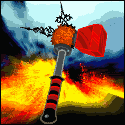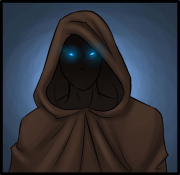|
ManMythLegend posted:I think the future of tabletop gaming is certainly digital, just not in the traditional way of simply transitioning the rules to a digital space, but a game that is both fully "digital" and fully tabletop. Something that creates a full digital world that players can interact with, and change, around the table. Why? Why is this the inevitable, ultimate endgame? That's like saying the endgame for board games is digital since they can't compete with video games otherwise (and I'd be shocked if TTRPGs occupy the same "headspace" as video games, but board games don't for some reason), yet board games are enjoying a golden age never before seen in the medium. There's some that use digital elements and some of the bigger ones get iOS versions, but they're hardly the standard and the physicality of the medium is a big part of the appeal to many players, dedicated collectors and casual fans alike. Are you sure you aren't just saying what you think would be cool and assuming it's the obvious conclusion?
|
|
|
|

|
| # ? May 19, 2024 20:54 |
|
Every single time someone even vaguely academic turns their gaze upon role-playing games, the thing that they identify as the defining characteristic is that an RPG allows players to attempt anything, in principle. This is not something any video game can even attempt to approach, and anything that could would arguably no longer be a video game anymore. Saying that TTRPGs occupy the same headspace as videogames doesn't just include board games (and with them wargames and card games), but probably conflates most of our leisure activities. But nobody argues that TTRPGs have to compete with TV.
|
|
|
|
|
RPGs don't make money is the #1 thing you hear from everyone involved in the discussion so it makes sense that everyone is trying to figure out how to change that, and going digital lets you work at much higher profit margins from print. That's why I think that the solution is going to be to shove all that necessary but expensive to print information into apps (or PDFs I guess) in order to give you the level of profit you need to sustain a game long term. You need to have a physical aspect to the game though, which is what board games are doing to beat RPGs handily. Lots of board games could easily be small books of just the rules, hell Print and Play versions are basically exactly that. Descent could easily be an RPG handbook with charts of what each dice roll means for each player but it would sell like poo poo. I don't know any numbers for Gamma World but I bet it sold significantly better as a box set then it would have as a $20 book. I'm not saying you shouldn't produce a book, but I think we're past the days where it's going to be the aspect of the game you rely on making you any money.
|
|
|
|
I'd be interested in seeing what would happen if you brought the.Risk Legacy format to RPGs. Like a module that could only be played once, or a character whose choices made physical changes to its media which could not be undone.
|
|
|
|
moths posted:I'd be interested in seeing what would happen if you brought the.Risk Legacy format to RPGs. Like a module that could only be played once, or a character whose choices made physical changes to its media which could not be undone. All RPGs are essentially Legacy style products as long as you consider your shared game world the "media" that you're making changes to. It would be interesting to see a game that establishes firm groups of NPCs whose power waxes and wanes as you interact with them, in a way that gives you some sort of mechanical benefits. The problem is that's the sort of thing that usually doesn't have firm rules attached to it. I sort of remember FATE's campaign design chapter having a lot of cool stuff related to that though, establishing stuff like plans of action for the game's major players and how things will change if the players don't engage them vs if they do.
|
|
|
|
There's still a sense that the game world is in "pencil," if that makes sense. The DM can arbitrarily retcon, contradictory material can get published, etc. I mean physical media that goes way beyond the DM taking notes in pen. "Open one envelope and burn the other" type choices.
|
|
|
moths posted:There's still a sense that the game world is in "pencil," if that makes sense. The DM can arbitrarily retcon, contradictory material can get published, etc. What would be the purpose of this? What makes it anything more than a gimmick that trades on nostalgia?
|
|
|
|
|
I'm more interested in rules for moving a campaign forward generationally -- what happened to the cities you visited, the laws you instituted, the business schemes you started, the cults you quashed, the evils you banished? Did your previous PCs have children, and if so, are the new PCs descended from them?
|
|
|
|
I'm assuming it's to reinforce the permanent changes you've made to the game-world by making physical changes to the real world media that contains it. I'm not really sure what the psychology behind Risk Legacy was, but people seemed to love making "real" changes to the game and lasting consequences.
|
|
|
|
I haven't played Risk Legacy, but the idea of opening envelope B and burning envelope A has a major weight to it that selecting the same options out of a book would not. Imagine a game with an strong setting attached that included envelopes the DM could crack open if the party crossed certain lines in the fiction - the drama of a player's action being followed by the DM reaching for an envelope that he doesn't even know the contents of would be palpable.
|
|
|
|
When a new thing breaks a rule you didn't even realize was a rule, it can be delightfully revelatory. The "rule" in this case was that you keep your boxed boardgame nice and play it, potentially, forever. Risk: Legacy violates that by having you permanently disfigure your board, writing things on it, putting stickers on it, etc. For an RPG I don't think there's a rule like that there to be broken. I suppose if you were cutting pages out of your physical hardcopy book? Crossing out rules? Writing stuff in? The campaign world and the characters and the events that take place are all already ephemeral... imaginary, codified in temporary notations on character sheets and GMs notes, but in pencil. Your hit points go down, they go up; you visit Waterdeep or the Keep on the Borderlands, it's different place now for you, because your GM wrote that down in his notes, but ten years later if you want to play that dungeon again, you can, and it can be exactly the same as it was when the box was still shrink-wrapped. E. The envelopes thing sounds cool, until I think about how as a GM I always want to read ahead so I can customize what the stock text/stats/encounters/setting/rules were as needed to suit me. Even when we're playing a firmly railroaded adventure module. Otherwise, what am I there for? Scripting the enemy figure's attacks? There are lots of AI charts and tables out there that can do that. ...there used to be solo adventure modules for D&D, which basically did that. I'm the kind of guy who would stick my finger in the choose your own adventure book when picking an option so I can go back, basically savescumming. I guess I could see the appeal of a CyoA product where you burn the path you didn't go down. But to me that's not the big cool part of the Risk game: the cool part is that you and your gaming group evolve your own, personal-to-you world to play RISK on, the board becoming a record of past events. It's board-game-as-consumable. Which RPGs already do, really. Leperflesh fucked around with this message at 20:22 on Jun 25, 2015 |
|
|
|
homullus posted:I'm more interested in rules for moving a campaign forward generationally -- what happened to the cities you visited, the laws you instituted, the business schemes you started, the cults you quashed, the evils you banished? Did your previous PCs have children, and if so, are the new PCs descended from them? Well, you don't really need rules for that, that's all supposed to be things that the GM and players take care of. I mean if you want your character to have kids, just say so. In an L5R game I'm in the GM said that a year had passed between story arcs, so I just said that my character now had a kid. No special rule needed. Off the top of my head the only RPG that really codifies that kind of stuff is Pendragon.
|
|
|
|
Dr. Tough posted:Well, you don't really need rules for that, that's all supposed to be things that the GM and players take care of. I mean if you want your character to have kids, just say so. In an L5R game I'm in the GM said that a year had passed between story arcs, so I just said that my character now had a kid. No special rule needed. Off the top of my head the only RPG that really codifies that kind of stuff is Pendragon. I know you don't need rules for that. There is no part of RPGs that you could not replace with GM + player agreement. What differentiates RPGs from one another are their themes and the parts they choose to codify with rules, and generational RPGs are not something I have seen often.
|
|
|
homullus posted:I'm more interested in rules for moving a campaign forward generationally -- what happened to the cities you visited, the laws you instituted, the business schemes you started, the cults you quashed, the evils you banished? Did your previous PCs have children, and if so, are the new PCs descended from them? https://en.wikipedia.org/wiki/Fire_Emblem:_Genealogy_of_the_Holy_War
|
|
|
|
|
It would have to be something like one of the old boxed D&D campaigns. But there's absolutely the "rule" that all the information in a book is there. One player already knows what all the outcomes are. After an adventure, you might ask the DM what would have happened if you agreed to the duke's plan, or had chosen to open the other sarcophagus. But here you'll never know. The unused envelope got shredded, or the unexperienced flavor paragraph wasn't revealed with the invisible ink marker. E: You'd be experiencing it with a higher stake, since you can't keep a finger on page 12 to go back if you don't like the option that took you to p34. Like, Iron CYoA where you tear out pages and only read it once. moths fucked around with this message at 20:30 on Jun 25, 2015 |
|
|
|
There are a few video games that do it. I want to see it in tabletop RPGs, where players can influence, but do not control, what the world is like for their next fresh-faced band of adventurers. In a rule-governed sort of way. Like, maybe some things that are definitely decided by the individual, some things that are decided by the group , and some things that were unknowable and uncontrollable by any but the GM/game system.
|
|
|
|
Dr. Tough posted:Well, you don't really need rules for that, that's all supposed to be things that the GM and players take care of. I mean if you want your character to have kids, just say so. In an L5R game I'm in the GM said that a year had passed between story arcs, so I just said that my character now had a kid. No special rule needed. Off the top of my head the only RPG that really codifies that kind of stuff is Pendragon. The whole reason I'm buying a game though is for the rules. I would love to see a game that works something like XCOM, with the tactical combat of something like 4th Edition D&D, but also a Big Picture mode that has rules for how my players have influenced the world at large and what sort of mechanical effect that has had. moths posted:It would have to be something like one of the old boxed D&D campaigns. But there's absolutely the "rule" that all the information in a book is there. One player already knows what all the outcomes are. The more you explain this idea the more on board I am with it. Basically RPGs need to become more tightly themed, I don't need another quasi-medieval fantasy themed game but I would love a game that's all about the development of a few Kingdoms with rules for retirement and a new generation taking up the mantle of heroes. Pass on your equipment to your children FE4 or Phantasy Star 3 style so that they can tackle bigger threats. Actually I'm already working on something I could maybe develop in that direction. Hm.
|
|
|
|
Effectronica posted:Every single time someone even vaguely academic turns their gaze upon role-playing games, the thing that they identify as the defining characteristic is that an RPG allows players to attempt anything, in principle. This is not something any video game can even attempt to approach, and anything that could would arguably no longer be a video game anymore. Saying that TTRPGs occupy the same headspace as videogames doesn't just include board games (and with them wargames and card games), but probably conflates most of our leisure activities. But nobody argues that TTRPGs have to compete with TV. I think that some video games (specifically, the ones that enable and encourage heavy modding) aspire to the same attempt-anything ideal. The difference is that in a CRPG, it's easier said than done, whereas in TTRPGs, it's often literally as easily done as said.  Something like Skyrim with all its mods is on the road there as far as videogame-world customization. There just needs to be a leap forward in the accessibility so that I'm not waiting 1-4 years after the release of a game for it to become what I really wanted it to be. I think someday that leap will be here and it'll be really cool. I mean yeah, we all wring our hands about how people just use Second Life to indulge their weird fetishes, but we wring our hands about the same sorts of things in TTRPGs so I think it's a wash.
|
|
|
|
Misandu posted:The whole reason I'm buying a game though is for the rules. I would love to see a game that works something like XCOM, with the tactical combat of something like 4th Edition D&D, but also a Big Picture mode that has rules for how my players have influenced the world at large and what sort of mechanical effect that has had. Again, I just don't understand why there needs to be special rules for this. The rules for this are already there: it's called playing the game. If the PC's stopped the cultists from killing the king then the result is that the king is still alive and any cultists that the PCs killed are not. You don't need to roll on a table for that. edit: although maybe I'm misinterpreting what you're saying. Games do exist that have the passage of time baked into them, The One Ring and Pendragon for example. I'm just not sure this is something that needs to be part of the default rules for RPGs. Dr. Tough fucked around with this message at 21:08 on Jun 25, 2015 |
|
|
|
What I see as the future of TTRPGs is digital tools - not digital games, but software that interactively assists the players (and GM, though ideally this should enable GM-less play by diffusion of responsibility). I'm envisioning an app where one player starts a cloud-backed "session" and the others all join it (monetize it by limiting the number of times it can be opened in a day or week and selling a premium version). It guides players through the phases of the game (especially character creation), persists a character sheet (potentially enabling the old dream of characters crossing from game to game),and provides access to other discrete activities that have strict rules. But there's the expectation that the players and the players alone will drive the narration. Crucially, what it does is walk the players through running a session, and provokes their imaginations appropriately by suggesting available options. Because it's software, you can make the "interface" fit the rules simple without affecting the depth of what they actually accomplish. A digital, interactive Apocalypse World playbook library and MC's guide that helps keep track of fronts and conditions, lists the available moves, provides reminders for when you're supposed to Go Aggro and when to Seize By Force, and has big, friendly buttons that roll the dice for you. The purpose of this program is to answer the question "What do I do now (in order to continue)?" and to ask the question "What do you want to do next (of these options)?" Oh, and if the game has a grid then the app also needs a grid.
|
|
|
|
Dr. Tough posted:Again, I just don't understand why there needs to be special rules for this. The rules for this are already there: it's called playing the game. If the PC's stopped the cultists from killing the king then the result is that the king is still alive and any cultists that the PCs killed are not. You don't need to roll on a table for that. Why do there need to be special rules for whether players hit the bad guys with an axe? You could make a game in which the players literally never miss, or that they decide when they miss. Why have rules for whether the players' business succeeds, or have special rules for vehicle combat, or how much it costs to build a stronghold? Answer: some players enjoy subsystems with a mixture of rule-governed behavior and unexpected outcomes. Why is this hard to understand?
|
|
|
|
Evil Mastermind posted:I actually just remember that the old Warhammer Quest board game had something like that. It came with a "Roleplay Book" that was more or less babby's first RPG. You still sent your little guys through the dungeon missions and such, but the idea of the Roleplay book was to say "okay, now that you've played this swordsman a few times, you're probably wondering what happens to him when he's not running around a dungeon killing things." White Box D&D was that way with the original Chainmail to be honest. The combat system was pretty much cribbed en mass and it wasn't until the the Greyhawk Supplement was released that we had the descending armor class as the primary resolution. The Blackmoor tried to add a weird hit location system that nobody ever used.
|
|
|
|
Leperflesh posted:...there used to be solo adventure modules for D&D I've been debating trying to run an ... LP, I guess, of Scarlet Heroes, just to show off its random generation aspects along with its support for solo play.
|
|
|
|
gradenko_2000 posted:I've been debating trying to run an ... LP, I guess, of Scarlet Heroes, just to show off its random generation aspects along with its support for solo play. You mean GMing yourself?
|
|
|
|
Evil Mastermind posted:You mean GMing yourself? A bit of that, a bit of crowdsourcing the details and general direction, CYOA-style.
|
|
|
|
Ah, yeah that's a 1-on-1 game. I meant, there used to be adventure supplements where the game book served as the GM, and you could just play your one character. Like a choose your own adventure book, but with more crunch. ...that would be a fun LP to read though I bet. Please link it if you do that.
|
|
|
|
Those used to exist. Didn't do very well. I want to say TSR put some out.
|
|
|
|
Yeah, they probably sucked. I mean, most modules suck, requiring a lot of work by the GM to make them useful, but you can't really do that if you're the player. And of course, D&D is a social game; if you're just gonna play on your own, and can't modify the game or go beyond its borders the way you can with a moderated game... then it's just a lovely one-shot computer game, but with more paperwork. You might as well play ZORK.
|
|
|
|
Mors Rattus posted:Those used to exist. Didn't do very well. I want to say TSR put some out. West End Games put out quite a few, especially for Star Wars. There was even one inside a larger setting sourcebook. Some of them were okay-ish as I recall, but I was 12-15 at the time.
|
|
|
JerryLee posted:I think that some video games (specifically, the ones that enable and encourage heavy modding) aspire to the same attempt-anything ideal. The difference is that in a CRPG, it's easier said than done, whereas in TTRPGs, it's often literally as easily done as said. No matter how many mods I pile on top of Fallout: New Vegas, I will always be able to come up with something the game doesn't allow me to do, until the map becomes the territory and the simulation becomes the real. TTRPGs don't have this problem because they're improvisational.
|
|
|
|
|
Dr. Tough posted:Again, I just don't understand why there needs to be special rules for this. The rules for this are already there: it's called playing the game. If the PC's stopped the cultists from killing the king then the result is that the king is still alive and any cultists that the PCs killed are not. You don't need to roll on a table for that. Nothing should be part of the default rules for RPGs. That's a huge problem a lot of RPGs have traditionally had actually, is the assumptions of what the rules should cover. From the start of the hobby until very recently RPG rules have defaulted to being intensely focused on what happens when two people want to kill each other and gotten less interesting the further you got from that. Look at stuff like Ryuutama where travelling is a check you make, or Golden Sky Stories which revolves around helping out a small community and forming bonds with them.
|
|
|
|
"And now, the envelope..." *rustle* *rustle* "What? No, this is stupid. Give me five minutes." Leperflesh posted:...there used to be solo adventure modules for D&D, which basically did that. I'm the kind of guy who would stick my finger in the choose your own adventure book when picking an option so I can go back, basically savescumming. I've got a couple of those floating around. One is particularly hardcore, both in theme (the adventure begins with your character about to be lynched for a crime he didn't commit, and there are scenes where a coup de gras is set up with a light spell cast on someone's head) and in that you could only really play it a limited number of times-- it was an introductory, no-dice, no-rulebook module where 'random' numbers were arranged in invisible ink matrices.
|
|
|
|
We did a whole episode about how to resurrect tabletop games on my podcast recently. My correct opinions start ~39m in.
|
|
|
|
Everblight posted:We did a whole episode about how to resurrect tabletop games on my podcast recently. My correct opinions start ~39m in. I think you're going a little too far into strictly digital realms with these ideas, but the gist of it seems pretty good. Stuff like an app with randomized IAPs is a totally bullshit idea that should be kept as far as humanly possible from the game if you want it to exist in anything resembling it's current form as a thing people do together around a table, but the tone of 'automate the tedious bullshit' is something I agree with. I also like how your, I guess co-hosts, sorta trip over themselves talking about how crazy you are right after that. Once again I think you need to have physical stuff as part of the package, you just shouldn't expect to make your money off of high cost low margin stuff like books that can't be errata'd (which you touch on).
|
|
|
|
Leperflesh posted:Ah, yeah that's a 1-on-1 game. I meant, there used to be adventure supplements where the game book served as the GM, and you could just play your one character. Like a choose your own adventure book, but with more crunch. These Lone Wolf books do that and iirc are decent at it too. There's no classes but you do ability scores and other stats.
|
|
|
|
Leperflesh posted:In real life ... I'm pretty sure that the srd Wizards put out was much simpler than that. The beautiful online srd's (there were several) are the product of individual gamers or small teams trying to make a super usable interface.
|
|
|
|
Speleothing posted:I'm pretty sure that the srd Wizards put out was much simpler than that. The beautiful online srd's (there were several) are the product of individual gamers or small teams trying to make a super usable interface. Yeah. The difference being, Wizards had to actually pay people to do the work, whereas fans work for free. Another endemic problem in the TG industry. Well... problem only if you want professionally-made products.
|
|
|
|
grassy gnoll posted:For clarification, how is what you're picturing different from Vampire the Masquerade: Redemption or Neverwinter Nights? Those games were just digital versions of a table top game. Like a Roll20 site with graphics. I'm talking about a common game world where you can interact with it at a table with dice as well as on a PC or console or something. Like maybe the tabletop version of the game is an epoch prior to the video game, and the way people play around the table opens or closes portions of the video game world. Things like that where the primary player base would probably be digital, but for those who want get more out of it they can transition to the table and help build the world more. Countblanc posted:Why? Why is this the inevitable, ultimate endgame? That's like saying the endgame for board games is digital since they can't compete with video games otherwise (and I'd be shocked if TTRPGs occupy the same "headspace" as video games, but board games don't for some reason), yet board games are enjoying a golden age never before seen in the medium. There's some that use digital elements and some of the bigger ones get iOS versions, but they're hardly the standard and the physicality of the medium is a big part of the appeal to many players, dedicated collectors and casual fans alike. Are you sure you aren't just saying what you think would be cool and assuming it's the obvious conclusion? I don't think that board games appeal to the same things as video games and TTRPGs. Certainly some of them cleave closer to board games then RPGs, but games like Skyrim, The Witcher, and WoW are a lot closer to D&D then they are to Monopoly. I don't think it's a coincidence that the popularity and profitability of video games has risen while TTRPGs have plummeted to model train levels. While folks like us understand very well what TTRPGs offer that video games don't the same cannot be said of normal kids who only know of D&D indirectly. Certainly some of what I'm saying is based on what I think would be cool, but if we're defining the "next great TTRPG" as "the game that brings in a lot if new blood to the hobby" then I don't think we're going to get there simply by creating an online rules compendium with hyperlinks, no matter how cutting edge its organization is. ManMythLegend fucked around with this message at 00:39 on Jun 26, 2015 |
|
|
|
ManMythLegend posted:I don't think it's a coincidence that the popularity and profitability of video games has risen while TTRPGs have plummeted to model train levels. While folks like us understand very well what TTRPGs offer that video games don't the same cannot be said of normal kids who only know of D&D indirectly. What makes you say that the popularity of TTRPGs has "plummeted"?
|
|
|
|

|
| # ? May 19, 2024 20:54 |
|
Effectronica posted:No matter how many mods I pile on top of Fallout: New Vegas, I will always be able to come up with something the game doesn't allow me to do, until the map becomes the territory and the simulation becomes the real. TTRPGs don't have this problem because they're improvisational. My point is that making CRPGs "improvisational" in this sense is essentially just a technical/engine limitation and that those can be overcome as technologies and design philosophies advance. We may not ever be able to improvise in a CRPG with exactly the same ease as we can do so in a TTRPG but I fully expect them to converge until CRPGs can scratch that itch for most practical purposes.
|
|
|






























